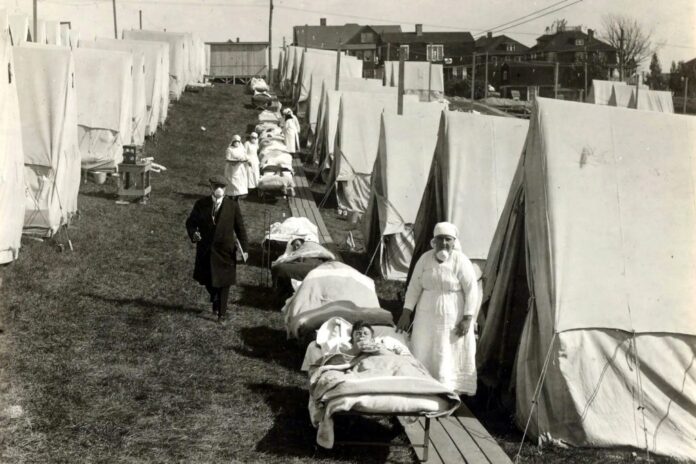The 1918 influenza pandemic has lessons to offer the current COVID-19 pandemic, and Virginia Tech history students will be detailing a number of those lessons during a live videocast on April 29.
“The 1918 pandemic remains the worst pandemic in history, killing 50 million people worldwide,” said Jeffrey Reznick, chief of the History of Medicine Division of the National Library of Medicine. “But the lesson of social distancing used then — or ‘reducing crowding,’ as contemporaries called it — can help us appreciate that this practice can work today to reduce transmission of the virus, pressure on our medical systems, and loss of life, all as we support health care providers on the front lines of the pandemic and scientists achieving a vaccine through careful and responsible study of data, evidence, and facts.”
In collaboration with the National Library of Medicine, undergraduates studying the history of data in social context will present several main themes from the 1918 pandemic that carry relevance today:
- newspaper reporting at the peak of the epidemic, which occurred from late September to early November 1918;
- social distancing policies and procedures;
- how contemporaries determined that the epidemic was ending; and
- how people remembered the remarkable experience of this brief, deadly, and intense crisis in community health.
The livestream program — titled “Reporting, Recording, and Remembering the 1918 Influenza Epidemic” — will be available for public viewing on April 29 from 2 to 4 p.m. on the National Institutes of Health videocasting page.
Discussants will include Nancy Bristow, chair of the Department of History at the University of Puget Sound and author of “American Pandemic: The Lost Worlds of the 1918 Influenza Epidemic” (Oxford University Press, 2012).
The public research symposium stems from a course in progress, “Topics in the History of Data in Social Context,” taught by E. Thomas Ewing, a history professor and the associate dean for graduate studies and research at the Virginia Tech College of Liberal Arts and Human Sciences.
“The 1918 influenza pandemic can teach us the importance of taking appropriate public health measures, paying attention to expert guidance on the potential impact of a disease outbreak, and understanding the uncertainty of making predictions of the scope and severity of an epidemic,” said Ewing.
The videocast is made possible through the National Library of Medicine’s formal partnership with the National Endowment for the Humanities to collaborate on research, education, and career initiatives. The National Library of Medicine is an institute of the National Institutes of Health.
The presentation will be subsequently archived on the National Institutes of Health website.
Background
E. Thomas Ewing is a professor in the Department of History at Virginia Tech, and the associate dean for graduate studies and research at the College of Liberal Arts and Human Sciences. He teaches courses in Russian, European, and world history while focusing his research on the history of influenza epidemics and that of information, knowledge, and data, among other areas.
The 1918 influenza pandemic happened to serve as the central research project for Ewing’s “Topics in the History of Data in Social Context” course in the spring semester. When Virginia Tech transitioned to online learning in March, the students continued to pore over news articles and other data related to the 1918 outbreak.
Watch the live webcast
April 29, 2020, 2 to 4 p.m. on https://videocast.nih.gov/watch=36347


